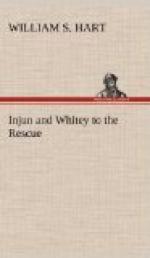When they reached the tracks, they dismounted and tied their ponies to neighboring telegraph poles, fearing the effect the noise of the train would have on the spirited animals. Then the boys went to the roadbed to await the coming of the train. The line stretched straight toward the west, until the rails seemed to join in the distance. But toward the east was a curve as the road approached a gully, at the bottom of which was a creek. It was from this creek that the water was drawn for the tank.
The sunrise had seemed to promise a fair day, but the promise failed, for a mist was forming over the plains. The train was not in sight, and Whitey kneeled, and placed an ear to the track, knowing that he could detect the vibration caused by the train before it appeared.
He rose and nodded his head. “I hear it,” he said. For once Whitey had it on Injun. He knew about railroads and Injun didn’t.
“Light the lantern,” said Whitey. Then he began to laugh.
Injun gazed at the lantern, then at Whitey. He could see no cause for laughter.
“I was wise when I suggested that lantern,” said Whitey. “I never thought that it would be daylight, and its light wouldn’t show.”
Injun almost smiled.
“What we ought to have is a red flag,” Whitey continued. “That’s the proper thing to signal a train with in daytime.”
Injun grunted, and Whitey considered the matter. “I have it! Your shirt!” he cried. “It’s pink, close enough to red. We’ll wave that.”
Injun grunted again and looked doubtful. “Me get ’im back?” he asked. Injun didn’t care any less for that shirt than he did for his pinto or his rifle—and he cared more for it than for his interest in the gold mine.
“Sure, you’ll get it back,” said Whitey, and without a word Injun took off the shirt and handed it to Whitey.
The boys gazed anxiously toward the west. Whitey thought of the three armed men, who now probably had handkerchiefs tied over their faces, and were lying in wait in the gully. Then of the oncoming train, with its unsuspecting passengers, and in the express car the bags of ore that were said to assay forty thousand dollars a ton. It wouldn’t take much of that to make it worth while for the bandits to hold up the shipment.
Although the mist was getting thicker, it seemed singular that the train did not appear. The inaction of waiting was beginning to get on Whitey’s nerves—and would have affected Injun’s if he’d had any. At that, they had not been waiting very long, though they did not know it.
“It must be getting near. I’ll listen again,” said Whitey.
Whitey again placed his ear to the track, then looked up blankly. “It’s stopped,” he said, “Mebbe there’s been an accident.”
Injun knew a good deal about plains and woods, and animals and birds, but was rather in awe of trains. He gazed at Whitey’s face, which wore the same blank look as his own, and ventured no opinion. Two sharp, faint sounds came from the east—something between the crack of whips and the popping of corks. They were followed by three more.




